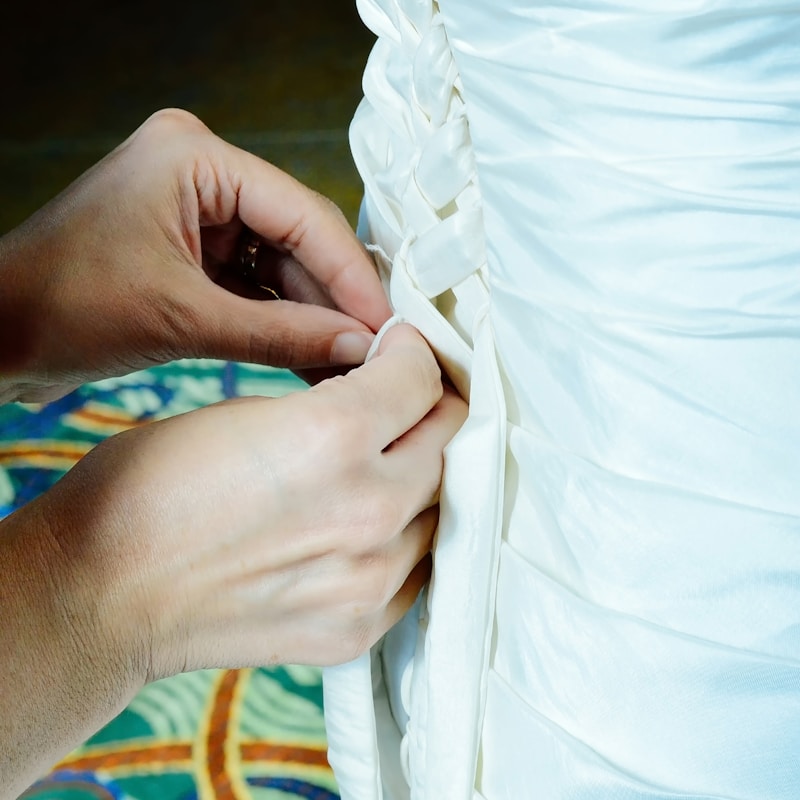The Significance of Fabric Choice in Bridal Dresses: A Comprehensive Guide
The Significance of Fabric Choice in Bridal Dresses: A Comprehensive Guide
Choosing the perfect bridal dress is one of the most critical aspects of wedding planning. Among the myriad of choices brides face, fabric selection often holds greater significance than one might initially consider. The fabric not only defines the dress's aesthetic but also influences comfort, fit, and overall bridal experience. In this article, we will delve into the importance of fabric choice in bridal dresses, exploring various fabrics, their characteristics, and how they contribute to the overall bridal look.
Understanding Bridal Dress Fabrics
Bridal gowns come in a variety of fabrics, each offering unique qualities and aesthetics. Let's take a closer look at some of the most popular fabrics used in bridal dress construction:
| Fabric | Characteristics | Best For |
| Silk | Rich, luxurious, soft, and drapes beautifully | Classic and elegant gowns |
| Tulle | Lightweight, sheer, and fluffy | Ball gowns and romantic designs |
| Lace | Delicate, textured, and often used as an overlay | Vintage and bohemian styles |
| Satin | Smooth, glossy, and heavy, with a certain weight | Structured and formal dresses |
| Chiffon | Lightweight, soft, and flowy, ideal for layering | Informal and airy designs |
Understanding these fabrics and their suitability for different designs can help brides make informed decisions that align with their wedding theme and personal style.
The Role of Fabric in Design and Comfort
The choice of fabric in a bridal dress plays a crucial role not only in the design aesthetic but also in the bride's comfort on her special day. Choosing a fabric that feels comfortable against the skin can make a significant difference, especially during a long event. For instance, some fabrics can heat up quickly, which may be uncomfortable in warmer climates, while others may be too heavy for summer weddings. Understanding fabric breathability, weight, and drape is essential for ensuring a pleasant experience on the big day.
Common Bridal Dress Fabrics and Their Impact
When selecting a fabric, it's essential to consider how each fabric reacts to movement, climate, and even wedding venue. For example:

Silk: The Classic Choice
Silk is often regarded as the epitome of bridal gown fabrics. Its natural sheen and luxurious feel make it a top choice for evening weddings or sophisticated ceremonies. However, silk can be susceptible to creasing, so brides should take care when handling and storing silk dresses.
Tulle: Airy and Light
Tulle is another popular fabric, especially for ball gowns. This lightweight material adds volume without weight, making it perfect for designs requiring layers. Its sheer nature can also create ethereal effects, especially when paired with lace or beading.
Lace: Vintage Charm
Lace invokes a sense of classic romance. As a decorative fabric, lace can transform any dress into a vintage masterpiece. Lace overlays and intricate designs make it ideal for brides seeking a timeless and charming look.
Satin: The Formal Choice
Satin gives a bridal gown a formal elegance that works well for sophisticated weddings. Its heavier weight allows for dramatic silhouettes. However, its smooth surface can show imperfections, so brides should ensure a perfect fit.
Chiffon: Soft and Flowing
Chiffon is a soft, lightweight fabric great for creating flowing designs. Ideal for outdoor or beach weddings, chiffon allows for a free and airy feeling while maintaining a stylish look.
Factors to Consider When Choosing Fabric
Choosing the right fabric involves several factors that brides should consider to ensure their dress matches their vision for the wedding. Here are some critical aspects to keep in mind:
- Weather: Always consider the season and location of the wedding. Lightweight fabrics like chiffon or tulle are perfect for summer, while heavier fabrics like silk can suit winter events.
- Body Type: Some fabrics may not drape well on all body types. Consulting with a designer can help brides choose fabrics that flatter their figure.
- Wedding Theme: The fabric should align with the theme of the wedding. For instance, a rustic wedding calls for more organic and textured fabrics, while a formal ceremony may call for silk or satin.
- Comfort Level: Always prioritize comfort. Some brides may be more comfortable in flowing, lightweight dresses, while others may prefer structured, heavier fabrics.
Conclusion: Making the Right Fabric Choice
In conclusion, the significance of fabric choice in bridal dresses cannot be overstated. The right fabric not only influences the overall aesthetic and theme of the bridal gown but also ensures comfort and confidence on the special day. Brides should consider their personal style, comfort, and wedding details when selecting the perfect fabric. Ultimately, the right choice will enhance the bridal experience and contribute to the unforgettable memories of the wedding day. For brides-to-be, it’s advisable to spend quality time exploring fabric options, consulting with designers, and trying different samples to find the fabric that feels just right.
By taking these factors into account, brides can make informed decisions that lead to a dress they love, ensuring their wedding day is not only beautiful but also truly enjoyable.
